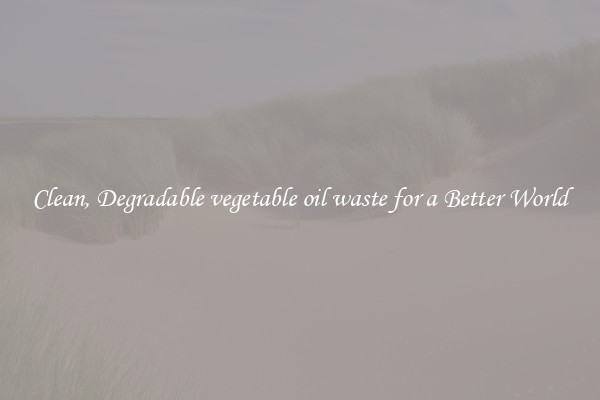Clean, Degradable vegetable oil waste for a Better World
Clean, Degradable Vegetable Oil Waste for a Better World

As the world grapples with the growing environmental concerns of pollution and waste, finding sustainable solutions has become paramount. One such solution lies in the clean and degradable management of vegetable oil waste.
Vegetable oil waste is a byproduct of various industries such as food service, agriculture, and biodiesel production. Improper disposal of this waste can have detrimental effects on the environment, including water pollution and soil contamination. However, when managed appropriately, vegetable oil waste can be transformed into a resource that benefits our world.
One of the most promising aspects of vegetable oil waste management is its potential for conversion into biodiesel, a renewable and alternative fuel source. Biodiesel can be produced by a process called transesterification, which involves breaking down the waste into glycerol and fatty acid methyl esters. Biodiesel derived from vegetable oil waste has similar chemical properties to fossil fuels, making it a viable alternative that reduces greenhouse gas emissions and lessens our dependence on non-renewable sources.
Furthermore, the leftover glycerol from the transesterification process can be used in the production of various products, including cosmetics, soaps, and pharmaceuticals. By utilizing this waste stream efficiently, we not only reduce the environmental impact of vegetable oil waste but also decrease the need for synthetic and potentially harmful chemicals in these industries.
Additionally, vegetable oil waste can be harnessed to produce biogas, a renewable energy source. Through anaerobic digestion, microorganisms break down the waste and release biogas, primarily composed of methane. This methane can then be captured and used as a clean-burning fuel for cooking, heating, and electricity generation. By utilizing vegetable oil waste in this manner, we reduce the reliance on fossil fuels while simultaneously preventing the release of methane, a potent greenhouse gas, into the atmosphere.
Moreover, the use of vegetable oil waste in organic farming can enhance soil fertility and nutrient content, further promoting sustainable agriculture. By composting this waste, valuable organic matter is added to the soil, improving its structure, water-holding capacity, and nutrient availability. This, in turn, leads to increased crop yields and reduces the need for synthetic fertilizers, which can have adverse effects on the environment.
In conclusion, the proper management of vegetable oil waste holds tremendous potential for a better world. By converting it into biodiesel, creating byproducts for various industries, harnessing biogas, and promoting sustainable agriculture, we can mitigate the negative environmental impacts associated with this waste. Embracing these clean and degradable solutions will contribute to a more sustainable future, lessening our carbon footprint and creating a world that thrives on renewable resources.

View details

View details

View details

View details








